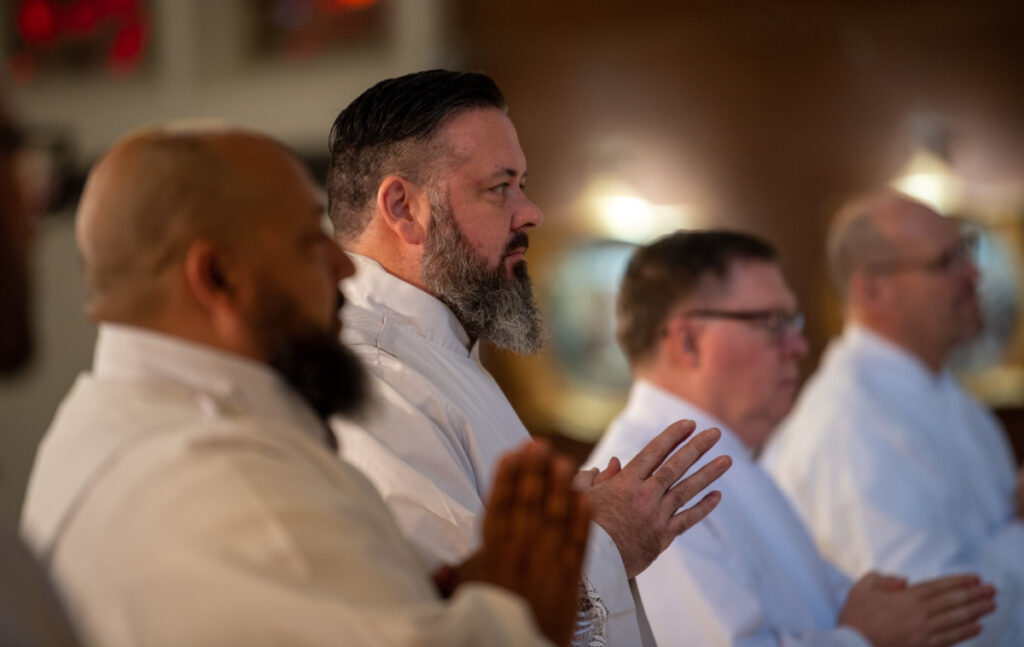
In a diocese where priests face steady demands from an expanding population, the permanent deacon is considered a vital part of the Church’s function. Today, seven new men are diving into that role.
By Jeff Grant, The Catholic Sun
PHOENIX — Seven men are diving into their new roles as permanent deacons this week after the Diocese of Phoenix formally began their service Saturday.
The group, whose function will be to directly assist priests in the parishes where they are assigned, was ordained in a joyous Mass, marked at times by solemn ceremony, at Ss. Simon and Jude Cathedral before about 500 worshippers, including family, friends, local parishioners, clergy and women religious.
The rite, celebrated by Bishop John P. Dolan – with Bishop Emeritus Thomas J. Olmsted, Auxiliary Bishop Eduardo A. Nevares, and priests of the diocese concelebrating – marked the formal start of the 2022 Cohort’s Diaconate duties and the finish of their formation, a solid 5-year process of learning, prayer, training and fellowship led by the Office of the Diaconate under the direction of Dcn. James Trant and Associate Director of Education and Formation, Dcn. Doug Bogart.
The congregation greeted the men with loud, hearty applause at the end of the Mass, which saw them profess their devotion to the Church and its teachings, as well as obedience to Bishop Dolan during their years of service.
“They really are a fine group of men.” — Dcn. Doug Bogart, associate director, Education and Formation, Office of the Diaconate
Clearly defined by the Catechism of the Catholic Church (Paragraph 1570), the permanent deacon’s role is, at its core, intended to fulfill the purpose of their earliest predecessors.
As recorded in the 6th Chapter of the Acts of the Apostles, deacons were appointed to fill the gap posed by a growing infant Church, allowing the Apostles to devote themselves to prayer and the ministry of the Word while the deacons handled administrative duties.
Today, a deacon’s responsibilities are much more.
Bishop Dolan outlined those duties during his homily, reminding the congregation and the ordinands of the breadth of their work.
Helping priests and the bishops in the ministries of the Word, altar and charity; proclaiming the Gospel, preparing the sacrifice and distributing the body and blood of Christ to the faithful; to name a few. Also, at the bishop’s discretion, exhorting believers and unbelievers and instructing them in holy doctrine. In addition, they preside over public prayer, administer baptism, assist at and bless marriages, bring Communion to the dying, and conduct funeral rites.
“In all these duties, let them act with the help of God in such a way that (they are recognized) as disciples of Him ‘who did not come to be served but to serve,’” the bishop concluded, quoted from St. Paul’s Letter to the Philippians.
Following the homily, Bishop Dolan urged the group to remain: “men of good reputation, full of wisdom and the Holy Spirit. Firmly planted and grounded in faith, “without blemish and beyond reproach before God and others.”
“…so that… as you go out to meet the Lord on the last day, (you) may be able to hear Him say, ‘Well done, good and faithful servant. Enter into the joy of your Lord.’”
A poignant sequence and a deeply personal act for the ordinands followed.
The men lay prostrate in front of the altar — signifying their complete surrender of themselves to God and His service.
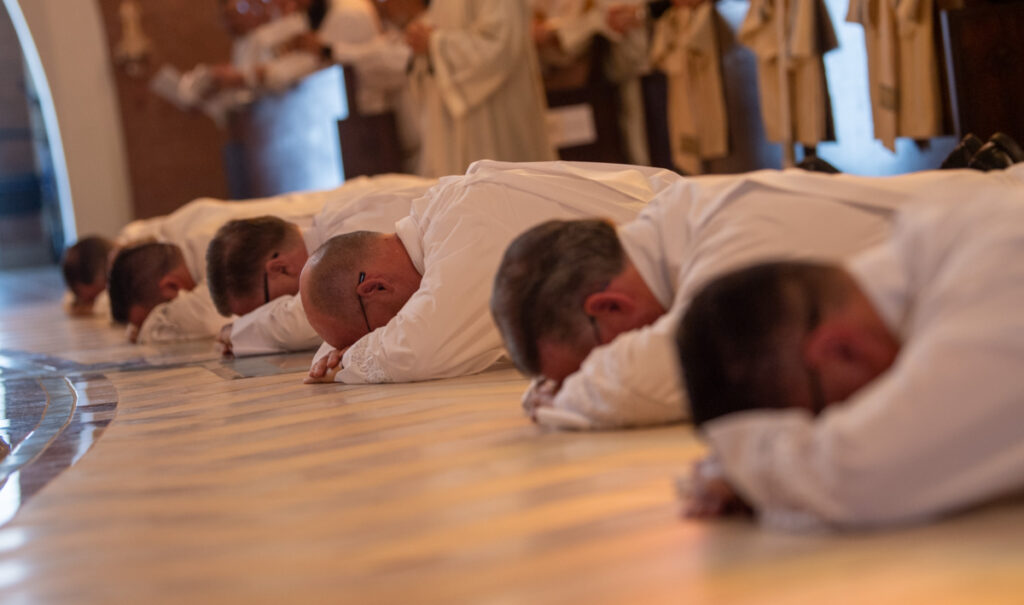 “It’s a beautiful rite,” said Bogart, the Diaconate Education and Formation Director. “…to say, ‘We’re here, and we’re ready.’ it’s also ‘‘Til death do us part.’ Even after [the deacon] can’t act because of health issues, that respect and obedience is there. Until that last breath, it’s there,” Bogart said.
“It’s a beautiful rite,” said Bogart, the Diaconate Education and Formation Director. “…to say, ‘We’re here, and we’re ready.’ it’s also ‘‘Til death do us part.’ Even after [the deacon] can’t act because of health issues, that respect and obedience is there. Until that last breath, it’s there,” Bogart said.
Rising once again to their feet, each ordinand then walked up the steps of the altar, knelt before the bishop, and received a silent blessing.
The bishop then prayed aloud.
“Look favorably on these, your servants, we pray, O Lord, whom we humbly dedicate to serve at your holy altars and in the Office of the Diaconate. Send forth, your Holy Spirit upon them, that they be strengthened by the gift of your sevenfold grace to carry out faithfully the work of the ministry. May every evangelical virtue abound in them: unfailing love, concern for the sick and the poor, May your precepts shine forth in their conduct, that by their manner of life they may inspire the imitation of your holy people. May they remain firm and steadfast in Christ.”
The deacons then put on their new vestments.
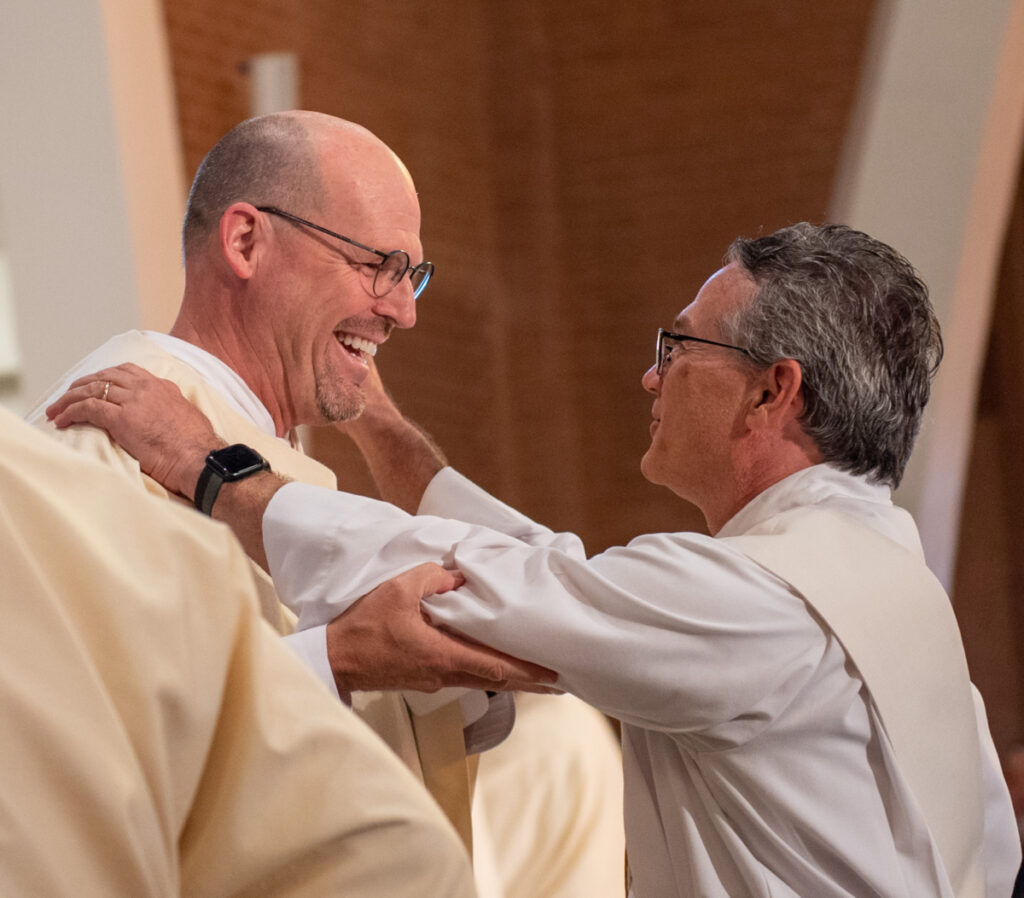 “I call it the starting line. When hands laid on them, they are in the race,” Bogart said. “I get to watch the Holy Spirit transform these men and (their wives) over 5 years. It’s beautiful.”
“I call it the starting line. When hands laid on them, they are in the race,” Bogart said. “I get to watch the Holy Spirit transform these men and (their wives) over 5 years. It’s beautiful.”
The experience left the seven joyful, amazed and exhilarated.
“I’m humbled; grateful to God for where he’s bringing me,” smiled William Booth, who will serve at St. John Vianney in Goodyear, a growing parish and home to part of the West Valley’s sizable Latino population.
During the Mass’ first reading, when the lector read God’s reminder to the prophet Jeremiah, “Before I formed you in the womb, I knew you, before you were born, I set you apart;” Booth said he found himself humbled and awestruck, realizing God had planned this moment before he was born.
“I was like, ‘Oh, wow!’ It really hit my heart big,” he said. “It’s a great feeling, knowing God is using you and giving you that grace to go out and serve.”
Ramsey Echeverria, who is assigned to St. Andrew the Apostle in Chandler, his home parish, was moved as well.
During the entrance, as he was making his way up the sanctuary’s center aisle, Echeverria reflected on how God had led him to this place in his life.
“I would never, ever have guessed this was going to happen 10-15 years ago,” Echeverria said during a jubilant post-Mass reception inside the parish hall with his wife, Monique, at his side. “God works in mysterious ways, and He totally did that with me.”
Lying prostrate as the congregation sang the Litany of Supplication, Echeverria thought of all the saints he depended on during his formation, “…all over me there’s grace. It’s very humbling. You’re thinking, ‘I’m your servant, Lord. Here am I.’”
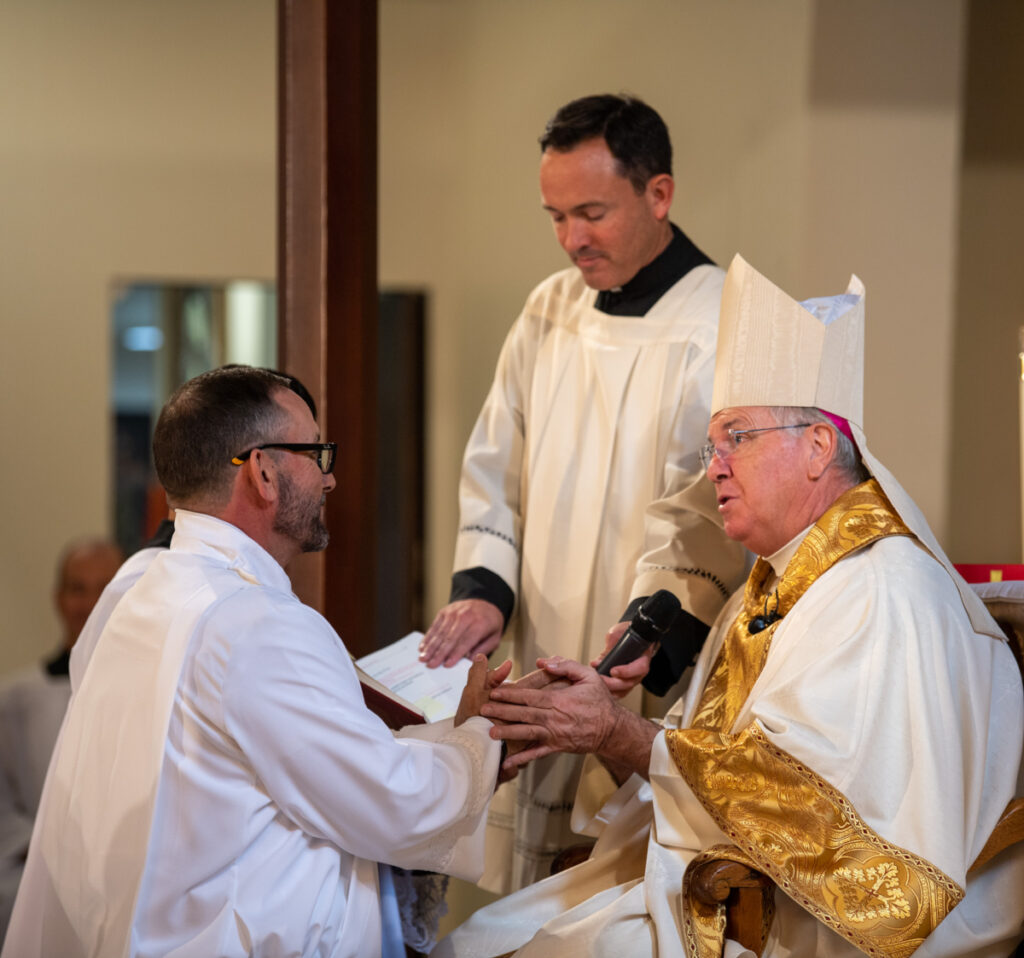 Echeverria’s cousin, Carrie Woolsey, who grew up with him at St. Anthony of Padua Church in Casa Grande, described her relative as “a beautiful man with a beautiful family. He’s always been a kind soul,” said Woolsey, who still attends St. Anthony. “He’s animated. He can reach so many different people. He will do a fabulous job because he’s so human.”
Echeverria’s cousin, Carrie Woolsey, who grew up with him at St. Anthony of Padua Church in Casa Grande, described her relative as “a beautiful man with a beautiful family. He’s always been a kind soul,” said Woolsey, who still attends St. Anthony. “He’s animated. He can reach so many different people. He will do a fabulous job because he’s so human.”
When Echeverria feels challenged, discouraged or in need of wisdom, he will recall a verse from Philippians, one of his favorite books of the Bible. “I can do all things through Christ who strengthens me” (Phil 4:13).
“That’s what I have to tap into,” he said.
Patrick Thielen, who will serve at his home parish of St. Clement of Rome in Sun City, also is prepared for the challenge.
“It takes time and requires attention and focus,” said Thielen. “We were told that we should pray for something we wanted — a gift from God — and I prayed today for the gift of helping lead people to Christ and walk in discipleship,” said Thielen, 60..
Some people have described St. Clement, in the middle of a 55-and-older community, as ”God’s Waiting Room,” he explained. “I want to flip that so it’s more like, ‘We’re studying for our finals.’ Not just passively waiting for death but actively engaging with the Church, and the Lord.”
A desire since his early 20s, entering the diaconate was delayed for Thielen when “life [marriage, career, and family] happened.”
But he never gave up the idea, explained his wife, Kathy.
“It took a while. I’m real happy for him. We feel very blessed by God that he can be filling that service for the Church.”
The new deacons, all but one of whom will serve his home parish, are filling a vital need with priests and pastors occupied by their own demands. The seven join over 220 other permanent deacons throughout the diocese.
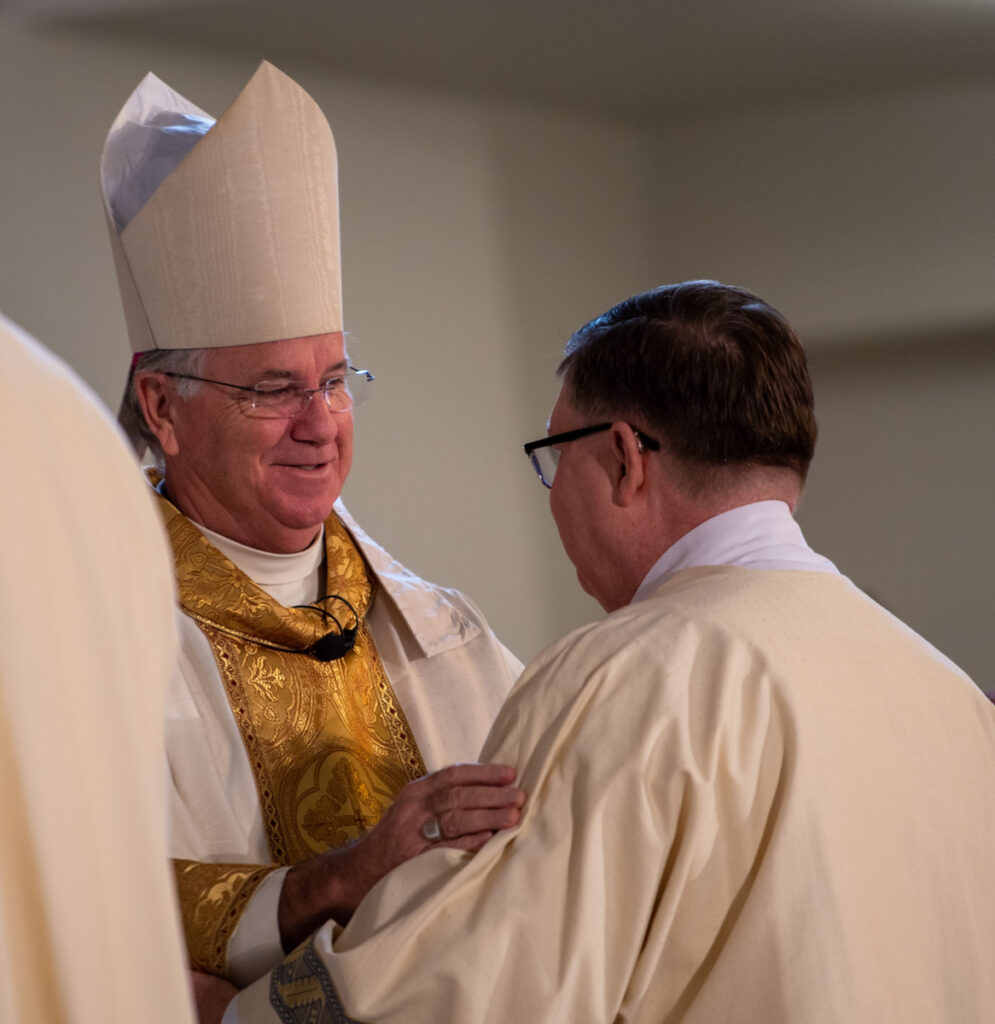 Because it involves working men with families, the permanent diaconate remains a viable Church vehicle for reaching believers and nonbelievers, said Bogart.
Because it involves working men with families, the permanent diaconate remains a viable Church vehicle for reaching believers and nonbelievers, said Bogart.
“They can take [the Bishop’s] mission and desire to transform the world into a place where he can’t go — the workplace, schools, hospitals, the police department, offices, the baseball diamond, and dance recitals,” he said.
“They have a foot in two worlds: at the altar and in the pews.”
Due to the formation’s length, the diocese ordains a new cohort every other year. The rites are held in even-numbered years. The next cohort will be ordained in 2024.



